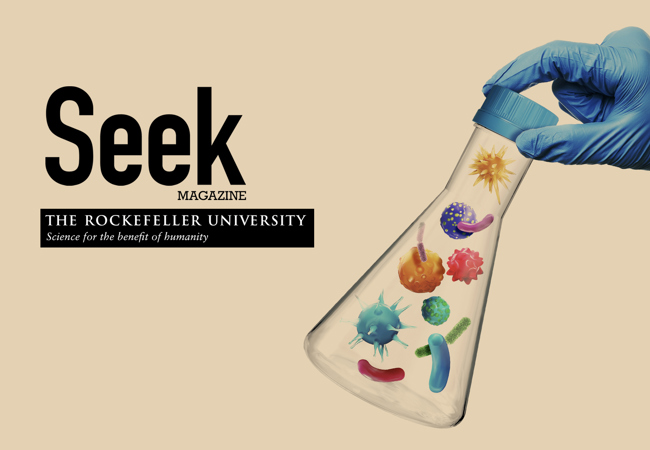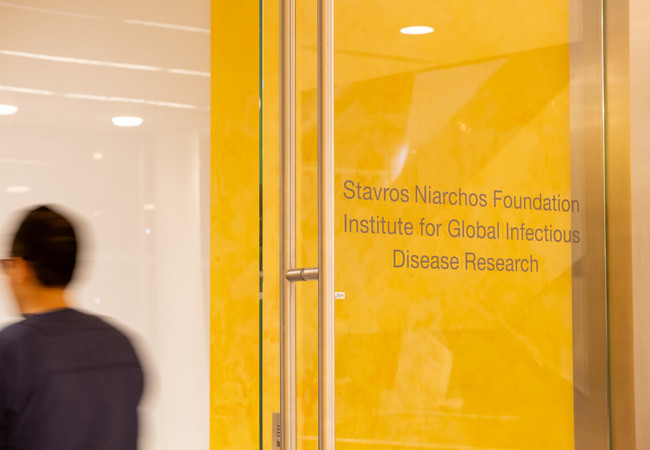Building on their longstanding relationship, a new partnership between the SNF and Rockefeller University has established the SNF Institute for Global Infectious Disease Research at The Rockefeller University, one of the world’s foremost centers of scientific achievement in biomedical research. This landmark investment in global health and science will combat infectious diseases around the world, from ancient pathogens like malaria and tuberculosis to recent and emerging threats.
Nobel Laureate Charles M. Rice, PhD will direct the institute. Dr. Rice leads RU’s Laboratory of Virology and Infectious Disease. Dr. Barry S. Coller, MD, Physician-in-Chief of The Rockefeller University Hospital, will serve as co-director for clinical studies. Dr. Michel Nussenzweig, MD, PhD, will serve as the co-director for immunological studies.
The new institute will ensure that Rockefeller investigators have the resources to take scientific risks in anticipation of, and in reaction to, global health threats. To have the funding and infrastructure in place to embark on research critical to the world’s health is paramount to stopping future pandemics. The past two years have especially demonstrated the importance of timely investments in basic science, swift and effective international collaborations, preparing the next generation of scientific leaders, and of public trust in science.
The SNF Institute for Global Infectious Disease Research’s mission encompasses all of these critical and complementary areas of research, partnership, training, and communication.
- SNF’s gift will support upgrades to the Rockefeller University Hospital and to laboratory biosafety levels, provide flexible funding for early-stage, interdisciplinary discovery science, and aid the acquisition of cutting-edge technologies. The Institute will also conduct related translational, bench-to-bedside research.
- The grant will also support the Institute to strengthen, formalize, and expand international collaboration, to convene annual scientific retreats that can catalyze new research directions and accelerate ongoing projects, to hold virtual research seminars for students and trainees throughout the year, and to organize broader multi-sectoral global conferences that encompass science, health, bioethics, and policy with a major focus on how to ensure access to quality health care.
- Additionally, SNF’s gift will enable the Institute to attract, train, and empower the next generation of scientific leaders through funding for promising young doctoral students and postdoctoral trainees to conduct infectious disease research. The Institute will also partner with the university’s science outreach program for middle and high school students, many from under-resourced schools, aimed at sparking interest in scientific and clinical careers.
- Finally, the Institute will combat misinformation through an expanded webinar series, building on RU’s successful COVID-19 webinars, and a variety of virtual events, all of which will be hosted and made available through a dedicated, engaging, and informative website.
Through these wide-ranging, timely, and complementary efforts, the new SNF Institute for Global Infectious Disease Research at Rockefeller will permanently establish fast-acting and long-lasting platforms for responding to newly emerging and stubbornly endemic pathogens alike.
This grant builds on a longstanding relationship between SNF and Rockefeller University, including most recently support for the new SNF-David Rockefeller River Campus which supports interdisciplinary collaboration between research laboratories to spur scientific advances. In the early days of the COVID-19 pandemic, SNF also supported round-the-clock COVID-related research at the university. Other SNF gifts to Rockefeller University have supported RU’s Women in Science Initiative, the SNF graduate fellowship, an endowed clinical scholarship, and the SNF Core Initiative.




